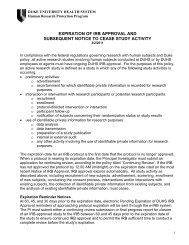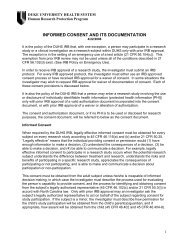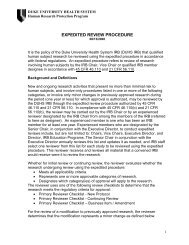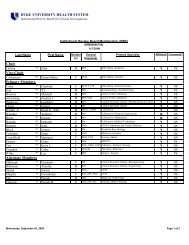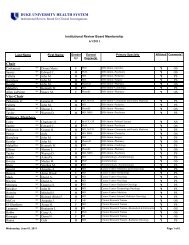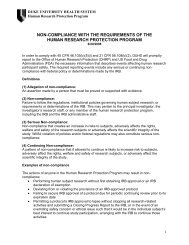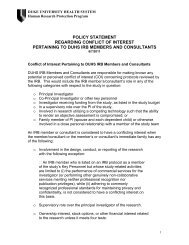waiver of documentation of consent/authorization - Duke University
waiver of documentation of consent/authorization - Duke University
waiver of documentation of consent/authorization - Duke University
- No tags were found...
Create successful ePaper yourself
Turn your PDF publications into a flip-book with our unique Google optimized e-Paper software.
DUKE UNIVERSITY HEALTH SYSTEMHuman Research Protection ProgramWAIVER OF DOCUMENTATION OF CONSENT/AUTHORIZATION12/4/2007A potential research subject’s agreement to participate in a research study is usuallydocumented by the subject indicating his/her approval to participate by signing anddating the <strong>consent</strong> form which includes, where appropriate, the HIPAA <strong>authorization</strong>information (referred to hereafter as the <strong>consent</strong> form). However, for certain types <strong>of</strong>research, the DUHS IRB may approve a <strong>waiver</strong> <strong>of</strong> <strong>documentation</strong> <strong>of</strong> <strong>consent</strong> (45 CFR46.117(c) and 21 CFR 56.109(c)(1)) and HIPAA <strong>authorization</strong> (45 CFR 164.512(i)(2)).In this case, evidence <strong>of</strong> the subject’s research participation would be evidence that theresearch subject had been willing to participate. These forms are available on theDUHS IRB website.Whenever the DUHS IRB approves a <strong>consent</strong> process involving <strong>waiver</strong> <strong>of</strong><strong>documentation</strong> <strong>of</strong> <strong>consent</strong>/<strong>authorization</strong>, the IRB ordinarily would need to approve awritten description <strong>of</strong> the study that also contains all <strong>of</strong> the elements <strong>of</strong><strong>consent</strong>/<strong>authorization</strong>. This written description may be in the form <strong>of</strong> a script for verbaluse, such as during a telephone conversation. However, the IRB may approve analteration <strong>of</strong> <strong>consent</strong>/<strong>authorization</strong> if some elements are omitted. The IRB must alwaysapprove a <strong>waiver</strong> <strong>of</strong> <strong>documentation</strong> <strong>of</strong> <strong>consent</strong> and, where appropriate, an alteration <strong>of</strong><strong>authorization</strong> if the investigator will not obtain a <strong>consent</strong> form signed and dated by theresearch participant.Under certain circumstances the Common Rule allows the IRB to waive written <strong>consent</strong>(<strong>documentation</strong> <strong>of</strong> <strong>consent</strong>) (45 CFR 46.117(c)):An IRB may waive the requirement for the investigator to obtain a signed and dated<strong>consent</strong> form for some or all subjects, if it finds either:(1) That the only record linking the subject and the research would be the <strong>consent</strong>document and the principal risk would be potential harm resulting from a breach <strong>of</strong>confidentiality. Each subject will be asked whether the subject wants <strong>documentation</strong>linking the subject with the research, and the subject’s wishes will govern; or(2) That the research presents no more than minimal risk <strong>of</strong> harm to subjects andinvolves no procedures for which written <strong>consent</strong> is normally required outside theresearch context. In cases in which the <strong>documentation</strong> requirement is waived, the IRBmay require the investigator to provide subjects with a written statement regarding theresearch.When the research involves an FDA-regulated product, the IRB may waive written<strong>consent</strong> only for research that meets item (2) above (21 CFR 56.109(c)(1) and 45 CFR46.117(c)(2)).The DUHS IRB considers the following points when assessing whether to approve<strong>waiver</strong> <strong>of</strong> <strong>documentation</strong> <strong>of</strong> <strong>consent</strong>:1
• Does the written description or script for presentation to the potential subjectinclude the required elements <strong>of</strong> <strong>consent</strong>, and additional elements, if applicable?• Does the written description or script for presentation to the potential subjectinclude the required elements <strong>of</strong> <strong>authorization</strong>?• Does the written description or script include the requirement for the signature <strong>of</strong>the subject or his/her legally authorized representative?• If the written description or script is to be signed and dated by the subject orhis/her legally authorized representative, and the <strong>consent</strong> process occurs bytelephone, does the written description or script include the requirement forsignature by a witness to confirm the identity <strong>of</strong> the subject?• Does the research involve no more than minimal risk, and would written <strong>consent</strong>be required for the study procedures if they were not part <strong>of</strong> a research study?In most cases a written <strong>consent</strong> form must be used to document <strong>consent</strong>/<strong>authorization</strong><strong>of</strong> the subject or the subject’s legally authorized representative. The <strong>consent</strong> form mustinclude the elements <strong>of</strong> <strong>consent</strong> required by 45 CFR 46.116 and 21 CFR 50.25, andmust be signed and dated by the subject or his/her legally authorized representative.However, unless required by the research protocol and the nature <strong>of</strong> the research, theresearch subject is not required (21 CFR 312.62(b)) to indicate the time <strong>of</strong> signing the<strong>consent</strong> form. The <strong>consent</strong> form template is available on the DUHS IRB web site:http://irb.mc.duke.edu/.The DHHS and FDA <strong>consent</strong> <strong>documentation</strong> requirements [45 CFR 46.117(2) and 21CFR 50.27(2)] permit the use <strong>of</strong> a “short form” written <strong>consent</strong> document that states thatthe elements <strong>of</strong> <strong>consent</strong> have been presented orally to the subject. The DUHS IRBpermits use <strong>of</strong> the “short form” written <strong>consent</strong> document when the investigatorunexpectedly encounters a non-English speaking subject and a written translation <strong>of</strong> theentire IRB-approved <strong>consent</strong> form cannot be provided in a language understandable tothe subject in a timely manner. In such cases, the investigator must follow the “DUHSIRB Policy on Research Involving Non-English Speaking Subjects” found at the IRBweb site.The use <strong>of</strong> a “short form” also requires an alteration <strong>of</strong> HIPAA <strong>authorization</strong> unless allelements <strong>of</strong> a valid <strong>authorization</strong> are included in the “short form”.Examples <strong>of</strong> situations where the IRB may waive or alter the requirement for<strong>documentation</strong> <strong>of</strong> <strong>consent</strong>/<strong>authorization</strong> include studies limited to focus groups, or mailor telephone surveys or interviews. When the IRB waives or alters the requirement forwritten <strong>documentation</strong> <strong>of</strong> <strong>consent</strong>/<strong>authorization</strong>, the findings will be documented by theIRB Writer in the Minutes or in supporting documents submitted by the PI, or if throughthe expedited review procedure, in the review form completed by the authorized IRBreviewer or in supporting documents submitted by the PI.2


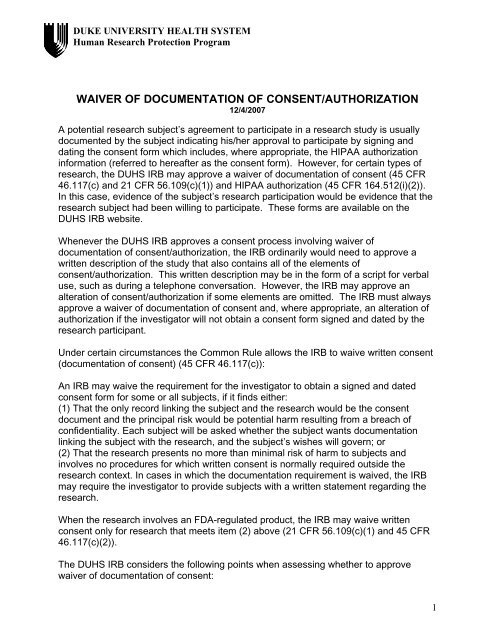
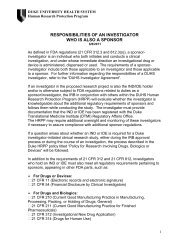
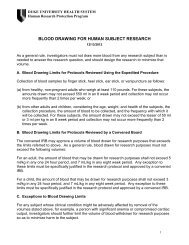
![Human Research Protection Program [Dr. Wesley Byerly]](https://img.yumpu.com/50293157/1/190x143/human-research-protection-program-dr-wesley-byerly.jpg?quality=85)
